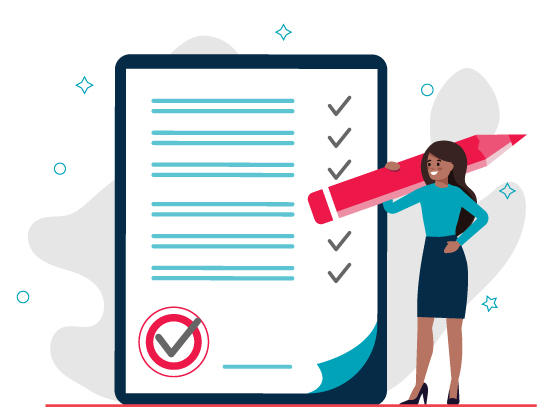Contact Us : 800.874.5346 International: +1 352.375.0772
Before you can become licensed as a certified public accountant, you must pass four parts of the Uniform CPA Examination, including three core sections: Auditing (AUD), Financial Accounting and Reporting (FAR), and Regulation (REG), and one of three discipline sections: Business Analysis & Reporting (BAR), Information Systems & Controls (ISC), and Tax Compliance & Planning (TCP). The exam process could take a year or more to complete, and most jurisdictions require 150 semester hours plus two years of experience. Additionally, some states require an ethics exam.
Each of the 55 U.S. jurisdictions (the 50 U.S. states plus DC, Guam, Puerto Rico, the Virgin Islands, and the Mariana Islands) maintains its own CPA requirements. When you decide to become a CPA, you must decide which jurisdiction you wish to become licensed in. You will apply for the CPA Exam and your CPA license in that state. You will need to abide by the CPA requirements of your jurisdiction to remain licensed.
Each jurisdiction maintains its own directory of requirements; however, there has been a movement toward uniform standards in recent years. For example, nearly all jurisdictions require 150 semester hours to become licensed as a CPA now. However, requirements can still differ among states. While international CPA Exam administrations are available, each licensing jurisdiction has specific requirements for citizenship and social security numbers, application/registration fees, early examination options, and passage of an ethics exam.
Additionally, licensing requirements may also differ by:
To be eligible to take the CPA Exam, you must meet the basic requirements of the board in the jurisdiction where you wish to become licensed. While these can vary by state, typical CPA Exam requirements include:

Most states require you to complete 120 credit hours at an accredited college or university in order to apply to take the CPA Exam. Of those 120 hours, usually a minimum of 24 hours of your coursework needs to be in accounting. Additionally, most states now require you to complete an additional 30 hours, or a total of 150 hours, to obtain your actual CPA license.
Some states require you to also complete several hours in general business subjects like finance, business law, or management.
Contact your state board of accountancy if you would like to confirm that your academic credits qualify. As part of the CPA Exam application process, you will have to submit your transcripts.
With almost every state requiring 150 college-level credit hours for licensure as a CPA, candidates with only a bachelor’s degree (120 credit hours) have to figure out how to bridge that 30-hour gap.

Experience requirements differ, but most state boards expect you to collect at least two years of experience in public accounting before they will grant you a CPA license. Some state boards accept accounting experience in areas of industry or government, but they generally require a more extended period.
In most cases, an active, licensed CPA will need to verify your work experience. Some state boards may require them to be your supervisor.
Two-tier states issue a CPA certificate once you have passed the CPA Exam and education requirements. These states will issue a CPA license once you meet the experience requirement.
Most states also require you to take a specific exam to demonstrate your understanding of ethics as a certified public accountant. While some state boards administer their own ethics exam, many use the Professional Ethics Exam administered by the AICPA.
The state boards determine an initial application fee. While NASBA has established the fee schedule for each CPA Exam section, the state boards can increase or decrease NASBA’s suggestions as desired. The state boards can also charge a registration fee for a candidate’s Notice to Schedule (NTS).
If a state board includes an ethics exam in its licensure requirements, then you will also face a fee for taking that. Finally, the state boards also assign a price to the CPA license itself, which can cost anywhere between $50-$300.

To practice public accounting, you must be licensed in the state where you practice. For most, it makes sense to become licensed in the state in which you live and work. If you follow the traditional CPA career path, the CPA requirements do not vary so much that they warrant selecting a different jurisdiction.
However, international candidates and others in non-traditional CPA roles must also select a state for their CPA license, even if they never intend to practice public accounting in the United States. When choosing a state for your CPA Exam and license, consider the following factors as you make your decision.
When deciding where to register to take the CPA Exam, first consider where you want to practice. If you choose to register for the exam in a state other than the one you want to practice in, check to see if you will be eligible to transfer scores between the two states and if you have met the state’s requirements for licensure.
Some state boards allow candidates to apply via CPA Central, one of NASBA’s CPA Examination Services (CPAES). With other state boards, you can apply on their website or by calling to request an application be mailed to you. As many state boards have age, citizenship, residency, Social Security, experience, and educational requirements, they expect you to provide documentation proving that you meet these requirements. Your CPA Exam cost may also vary according to the state you select.
Though most states are moving away from issuing a certificate upon completing the CPA Exam, a few states still do. These are called “two-tier” states. If you receive a CPA certificate, you may use “CPA” after your name, but you may not practice public accounting. Typically you must include “Not in public practice” after CPA. You can choose to go on to receive your CPA license by completing the remaining requirements.
Most states are one-tier, which means they do not offer a certificate but instead require you to complete all requirements before they recognize you as a CPA in any capacity.